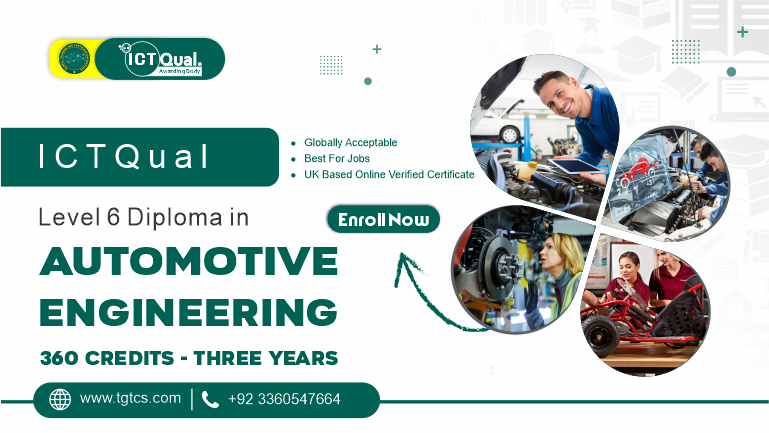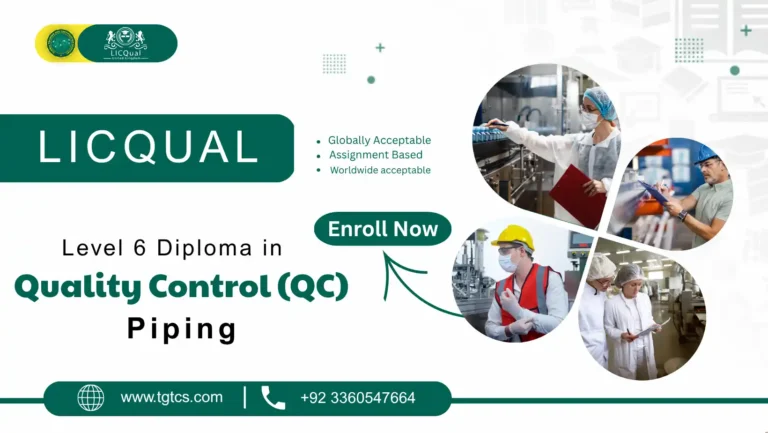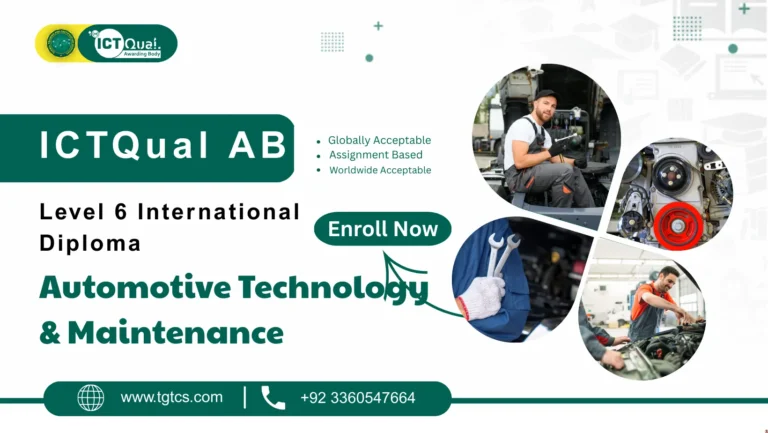ICTQual Level 6 Diploma in Automotive Engineering 360 Credits – Three Years
The ICTQual Level 6 Diploma in Automotive Engineering could be the perfect course to kickstart your career in the automotive industry. With a comprehensive three-year curriculum, this qualification is designed to equip you with the technical knowledge and practical skills needed to thrive in one of the world’s most innovative and fast-paced industries. Whether you’re aiming for a hands-on role or a leadership position, this diploma will set you on the path to success.
The ICTQual Level 6 Diploma in Automotive Engineering (360 Credits) offers a unique opportunity to delve deep into automotive technology, engineering, and design. Over the course of three years, students will gain expertise in areas such as automotive systems, vehicle dynamics, automotive manufacturing processes, and environmental sustainability. This qualification prepares you for a wide range of roles in the automotive sector, from vehicle maintenance and design to project management and innovation.
The automotive industry is rapidly evolving, with technology constantly changing the way vehicles are designed, built, and maintained. From advancements in electric vehicles to innovations in autonomous driving, the need for qualified automotive engineers has never been greater. By earning the ICTQual Level 6 Diploma in Automotive Engineering, you’re positioning yourself to take advantage of the latest trends and technologies in the automotive world.
The Global Training and Certification Services (TGTCS) is Directly Approved Training Centre of ICTQual
The ICTQual Level 6 Diploma in Automotive Engineering (360 Credits) is a comprehensive three-year qualification designed for individuals aspiring to build a career in the automotive industry. This diploma provides in-depth knowledge and practical skills in areas such as vehicle dynamics, automotive electronics, alternative fuel technologies, and vehicle maintenance and diagnostics. Students will gain expertise in automotive systems, manufacturing processes, and the latest technological advancements in the field.
Graduates of the program are well-equipped for a wide range of roles within the automotive sector, including automotive engineer, vehicle dynamics engineer, automotive systems engineer, and project manager. The course also prepares students for further studies and professional certifications, enhancing their career prospects in both traditional and emerging areas like electric vehicles and sustainability.
Mandatory Units
The Units of Level 5 Diploma in Automotive Engineering 240 Credits-Two Years are as :
Year 1: Foundation and Core Engineering Principles
- Introduction to Automotive Engineering
- Mathematics for Automotive Engineering
- Physics for Automotive Engineering
- Mechanical Engineering Principles
- Automotive Systems and Technology
- Electrical and Electronic Systems in Vehicles
- Engineering Materials for Automotive Design
- Vehicle Chassis and Suspension Systems
- Introduction to Vehicle Diagnostics
- Manufacturing Processes for Automotive Engineering
- Automotive Environmental Issues
- Health, Safety, and Environmental Management
Year 2: Advanced Automotive Technologies and Systems
- Advanced Engine Technologies
- Vehicle Dynamics and Handling
- Advanced Automotive Electronics
- Transmission and Powertrain Systems
- Vehicle HVAC Systems
- Vehicle Safety Systems
- Hybrid and Electric Vehicle Technologies
- Automotive Aerodynamics
- Automotive Materials Engineering
- Vehicle Assembly and Production Techniques
- Automotive Diagnostics and Troubleshooting
- Vehicle Testing and Performance Evaluation
Year 3: Industry Applications, Management, and Innovation
- Advanced Vehicle Design and Prototyping
- Automotive Control Systems
- Automotive Quality Control and Assurance
- Sustainability in Automotive Engineering
- Automotive Project Management
- Automotive Research and Development
- Vehicle Electromagnetic Compatibility
- Automotive Business and Marketing
- Autonomous Vehicles and Future Technologies
- Vehicle Fleet Management and Operations
- Automotive Regulatory Compliance and Standards
- Capstone Project in Automotive Engineering
Learning Outcomes for the Level 6 Diploma in Automotive Engineering (360 Credits – Three Years)
Year 1: Foundation and Core Engineering Principles
- Introduction to Automotive Engineering
Understand the evolution, key components, and the roles and responsibilities of engineers within the automotive industry. - Mathematics for Automotive Engineering
Apply advanced mathematical methods to solve engineering problems, with a focus on vehicle systems and technology. - Physics for Automotive Engineering
Demonstrate an understanding of the physical principles underlying automotive technologies, including mechanics and thermodynamics. - Mechanical Engineering Principles
Apply basic mechanical engineering principles, such as material properties and thermodynamics, in automotive design and manufacturing. - Automotive Systems and Technology
Gain knowledge of key automotive systems, including engines, transmissions, braking, and suspension systems. - Electrical and Electronic Systems in Vehicles
Understand the role of electrical and electronic systems in modern vehicles, including applications in vehicle control, safety, and efficiency. - Engineering Materials for Automotive Design
Identify and assess materials used in automotive manufacturing and design, understanding their properties in relation to vehicle performance and safety. - Vehicle Chassis and Suspension Systems
Understand the design, operation, and importance of vehicle chassis and suspension systems to ensure stability, handling, and safety. - Introduction to Vehicle Diagnostics
Develop skills in diagnosing vehicle issues using diagnostic tools and techniques, and understand common vehicle faults. - Manufacturing Processes for Automotive Engineering
Understand key manufacturing processes in automotive engineering, such as assembly, welding, and quality control in mass production. - Automotive Environmental Issues
Evaluate the environmental impact of automotive technologies, focusing on emissions, fuel efficiency, and the transition to green technologies. - Health, Safety, and Environmental Management
Apply health and safety principles to automotive engineering, ensuring compliance with industry standards and promoting sustainable practices.
Year 2: Advanced Automotive Technologies and Systems
- Advanced Engine Technologies
Develop an understanding of internal combustion engines, hybrid systems, and alternative powertrains, focusing on performance, efficiency, and innovation. - Vehicle Dynamics and Handling
Analyze the dynamics of vehicle motion, including handling, stability, and the effects of forces on vehicle performance. - Advanced Automotive Electronics
Explore advanced electronic systems in vehicles, such as automated systems, advanced driver-assistance systems (ADAS), and infotainment technologies. - Transmission and Powertrain Systems
Understand the design, function, and optimization of transmission and powertrain systems, with a focus on efficiency and performance. - Vehicle HVAC Systems
Understand the design and operation of vehicle heating, ventilation, and air conditioning systems, and their impact on comfort and energy efficiency. - Vehicle Safety Systems
Study the design, implementation, and effectiveness of passive and active safety systems, including airbags, crash sensors, and collision avoidance. - Hybrid and Electric Vehicle Technologies
Develop expertise in hybrid and electric vehicle systems, including battery technologies, energy storage, and electric drive systems. - Automotive Aerodynamics
Apply the principles of aerodynamics to improve vehicle performance, focusing on fuel efficiency, handling, and stability at high speeds. - Automotive Materials Engineering
Investigate the selection and application of advanced materials in vehicle design, including lightweight and high-strength materials for improved performance. - Vehicle Assembly and Production Techniques
Understand techniques used in vehicle production, such as robotic automation, lean manufacturing, and quality control. - Automotive Diagnostics and Troubleshooting
Apply diagnostic techniques to identify and resolve issues in complex automotive systems, improving vehicle performance and reliability. - Vehicle Testing and Performance Evaluation
Develop skills in testing and evaluating vehicle performance, including fuel efficiency, emissions, safety, and durability.
Year 3: Industry Applications, Management, and Innovation
- Advanced Vehicle Design and Prototyping
Apply advanced design techniques and technologies to prototype vehicles, using CAD, simulations, and rapid prototyping methods. - Automotive Control Systems
Analyze and design control systems used in modern vehicles, including electronic stability control, automatic transmission, and active safety systems. - Automotive Quality Control and Assurance
Implement quality control techniques in automotive production, focusing on defect prevention, process control, and continuous improvement. - Sustainability in Automotive Engineering
Develop sustainable engineering solutions for the automotive industry, including energy-efficient designs and green manufacturing processes. - Automotive Project Management
Manage automotive engineering projects, including budgeting, scheduling, risk management, and team collaboration. - Automotive Research and Development
Contribute to R&D activities in the automotive industry, focusing on new technologies, products, and solutions. - Vehicle Electromagnetic Compatibility
Understand electromagnetic compatibility in vehicles, focusing on minimizing interference and designing systems to meet EMC standards. - Automotive Business and Marketing
Apply business and marketing principles to the automotive industry, including market analysis, brand development, and sales strategies. - Autonomous Vehicles and Future Technologies
Explore the technologies behind autonomous vehicles, including AI, sensor systems, and the legal and ethical implications. - Vehicle Fleet Management and Operations
Learn the principles of fleet management, focusing on maintenance, logistics, and operational efficiency for managing vehicle fleets. - Automotive Regulatory Compliance and Standards
Understand automotive regulations, safety standards, environmental compliance, and industry certifications that govern vehicle design and production. - Capstone Project in Automotive Engineering
Apply knowledge and skills gained throughout the course to complete a comprehensive automotive engineering project, solving complex industry problems.
Course Benefits of the ICTQual Level 6 Diploma in Automotive Engineering (360 Credits – Three Years)
- Comprehensive Knowledge and Skills Development
This course provides an in-depth understanding of key automotive engineering principles, including mechanical, electrical, and electronic systems. Graduates will gain expertise in engine technologies, hybrid and electric systems, vehicle safety, diagnostics, and advanced manufacturing processes. - Hands-On Practical Experience
The program includes practical applications and project work that equip students with the skills to design, test, and troubleshoot automotive systems. Students will gain experience using industry-standard tools, diagnostic equipment, and manufacturing techniques. - Exposure to Advanced Automotive Technologies
Students will explore cutting-edge automotive technologies such as electric vehicles (EVs), hybrid systems, autonomous driving, and advanced driver-assistance systems (ADAS). This exposure ensures graduates are well-prepared for the evolving automotive industry. - Industry-Relevant Certifications
Graduates can pursue professional certifications such as Automotive Service Excellence (ASE) or specialized training in hybrid and electric vehicle systems, giving them a competitive edge in the job market. - Career Advancement Opportunities
The course is designed to prepare students for a variety of career paths in the automotive industry, including roles in vehicle design, diagnostics, R&D, manufacturing, and project management. Graduates can work for leading automotive manufacturers, service providers, or even start their own automotive consultancy. - Sustainability Focus
With an increasing emphasis on environmental sustainability in the automotive sector, the program covers the latest green technologies and energy-efficient vehicle designs. Graduates will be equipped to contribute to the industry’s shift toward more eco-friendly practices and innovations. - Comprehensive Capstone Project
The capstone project allows students to apply their learning to real-world automotive engineering problems. This project strengthens practical problem-solving skills and enhances the employability of graduates, as they demonstrate their ability to deliver high-quality, innovative solutions. - Strong Industry Connections and Networking
Throughout the course, students will have opportunities to collaborate with industry professionals and participate in networking events. This helps build valuable connections that may lead to career opportunities and internships. - Global Career Opportunities
With the automotive industry being global, the skills gained from this diploma open doors to career opportunities worldwide. Graduates can find employment with major automakers, suppliers, and technology companies in various regions. - Personal and Professional Growth
By completing this course, students will develop critical thinking, project management, and leadership skills. These competencies are crucial for career progression and for taking on managerial or senior roles within the automotive engineering sector.
Graduates of the ICTQual Level 6 Diploma in Automotive Engineering are well-equipped to excel in the dynamic automotive industry, with strong technical expertise, practical experience, and the ability to innovate in a rapidly evolving field.
Ideal Learner for the ICTQual Level 6 Diploma in Automotive Engineering (360 Credits – Three Years)
The ideal learner for the ICTQual Level 6 Diploma in Automotive Engineering is someone with a strong passion for vehicles and the engineering behind their design, performance, and technology. This learner is eager to explore the intricate systems that make up modern vehicles and is motivated to contribute to innovations in automotive technologies. Below are the key characteristics of the ideal learner:
- Interest in Automotive Technologies
The learner should have a deep interest in cars, vehicles, and the technology that powers them. A curiosity about how various vehicle systems (engine, transmission, safety features, etc.) work together is essential for success in this field. - Problem-Solving Mindset
Automotive engineering involves diagnosing issues, designing solutions, and improving vehicle systems. Ideal learners should have strong problem-solving skills and the ability to think analytically to identify, troubleshoot, and resolve complex engineering challenges. - Strong Foundation in Mathematics and Science
A solid understanding of mathematics, physics, and basic engineering principles is crucial. Ideal learners should have a background in these areas, as they will be applying advanced mathematical and scientific concepts to real-world automotive scenarios. - Technologically Savvy
As automotive engineering continues to evolve with new technologies such as electric and autonomous vehicles, learners should be comfortable with and excited about working with advanced electronics, computer systems, and automation. - Hands-On and Practical Approach
Automotive engineering requires hands-on experience with tools, machinery, and diagnostic equipment. Ideal learners should enjoy practical learning and be motivated by working directly with automotive systems to develop their technical skills. - Desire for Career in the Automotive Industry
The ideal learner is looking for a long-term career in the automotive industry and is driven to work with leading automotive manufacturers, suppliers, or even in emerging fields like electric vehicles, autonomous driving, or vehicle safety. - Attention to Detail and Quality Focus
Automotive engineering demands high precision and attention to detail, especially when designing, testing, and manufacturing vehicle systems. The ideal learner is meticulous, ensuring that every component works perfectly and meets high industry standards. - Team-Oriented with Leadership Potential
While automotive engineers often work in teams, the ability to lead and manage projects is valuable. Ideal learners should be prepared to collaborate with others, while also developing leadership skills that will be needed in managerial or senior engineering roles. - Eager to Embrace Sustainability
With the automotive industry’s growing focus on sustainability, including electric vehicles and reducing environmental impact, the ideal learner is motivated to contribute to green automotive technologies and innovations in energy-efficient designs. - Adaptable and Ready for Industry Change
The automotive sector is evolving rapidly with new technologies and industry standards. The ideal learner is adaptable and committed to lifelong learning, prepared to stay updated with emerging trends and technological advances such as 5G integration, AI, and autonomous vehicles.
This course is perfect for individuals who are passionate about vehicles and engineering, ready to develop the skills necessary for a successful career in the fast-paced and ever-evolving automotive industry.
Graduates of the ICTQual Level 6 Diploma in Automotive Engineering (360 Credits) have numerous opportunities for further education and career growth. The comprehensive skills and knowledge acquired during this course open doors to both advanced academic pursuits and professional development in the automotive industry. Here are some of the progression options:
1. Professional Certifications
- Chartered Engineer Status: Graduates can achieve Chartered Engineer status by becoming members of prestigious organizations such as the Institution of Mechanical Engineers (IMechE) or the Society of Automotive Engineers (SAE). This accreditation can significantly enhance career prospects in the automotive sector.
- Specialized Industry Certifications: Obtaining certifications in emerging fields such as Electric Vehicle (EV) technologies, Autonomous Vehicles, or Vehicle Diagnostics can give graduates an edge in specialized career roles within the automotive industry.
2. Career Advancement
- Automotive Engineering Roles: Graduates can progress to advanced roles within the automotive industry, such as Senior Automotive Engineer, Research & Development (R&D) Specialist, or Project Manager, especially in innovative fields like electric vehicles or autonomous driving systems.
- Management Positions: The technical expertise gained during the diploma opens doors to managerial positions such as Engineering Manager, Fleet Manager, or Production Manager, where graduates oversee teams and projects in areas like automotive manufacturing, maintenance, or development.
- Entrepreneurship: Graduates with entrepreneurial ambitions can start their own businesses in automotive repair, electric vehicle conversions, or other specialized automotive services, leveraging their solid technical foundation.
3. Industry Sector Opportunities
- Vehicle Manufacturers: Graduates can find opportunities with leading automotive manufacturers like Ford, BMW, Tesla, or Volkswagen, working in areas such as design, testing, engineering, or innovation.
- Automotive Aftermarket and Service Sector: The aftermarket industry offers numerous roles focusing on vehicle modifications, diagnostics, repair services, and specialized solutions.
- Automotive Consultancy and Innovation: Graduates may join consulting firms or launch their own consulting businesses, advising manufacturers and companies on innovations in vehicle design, efficiency, and sustainability.
4. Emerging Technologies
- Electric and Autonomous Vehicle Technologies: As the automotive industry shifts towards electrification and automation, graduates can specialize in electric vehicle design, battery technologies, and autonomous vehicle systems, helping shape the future of transportation.
- Sustainable Automotive Engineering: With the growing emphasis on sustainability, graduates have opportunities to contribute to the development of green technologies, recyclable materials, and energy-efficient vehicle designs.
The ICTQual Level 6 Diploma in Automotive Engineering provides a robust foundation for a wide range of dynamic and rewarding career paths, equipping graduates with the expertise required to thrive in a rapidly evolving automotive industry.
Course Overview
Course Level
Level 6
Course Units
36 Mandatory Units
Duration
Three year






